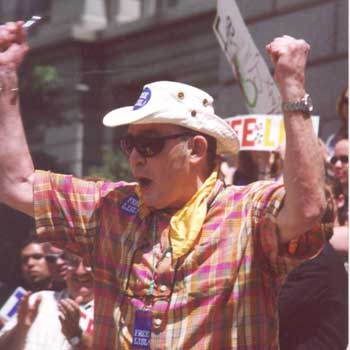Newsbrief:
Counterculture
Icon
Hunter
Thompson
Dead
By
His
Own
Hand
2/25/05
Author, provocateur, prodigious drug-taker and rabble-rouser Hunter Thompson's savage journey through life came to an end last Saturday when he committed suicide at his long-time home in the mountains outside Aspen, Colorado. He was 67 years old and reportedly suffering chronic pain from a broken hip and back surgery.
But it was his "Fear and Loathing in Los Vegas: A Savage Journey to the Heart of the American Dream" a few years later that fired the imaginations of countless American dreamers, including this writer, and made him forever an unapologetic spokesman for the young, the restless, and the reckless. "We were on the edge of the desert when the drugs began to take effect," the novel began. Before it ended 200 pages later, Thompson and his sidekick Oscar Zeta Acosta had consumed ungodly amounts of drugs -- uppers, downers, laughers, screamers, cocaine, ether, LSD, weed, even adrenochrome (best when extracted from the adrenal gland of a living human, Thompson wrote, it made his "heart beat like an alligator") -- frightened innocent hitchhikers, freaked out runaway girls, tripped their way through a District Attorneys convention, and, oh yes, visited a Las Vegas drug store to stock up on amyl nitrate. "I have one fuck of a case of angina pectoris," a sweating, jabbering Thompson told the befuddled druggist. After the surprise success of "Fear and Loathing," Thompson retreated to Aspen, where he ran for sheriff -- and nearly won -- on the Freak Power ticket in 1970. Thompson made Aspen his home base for the rest of his life, but soon returned to the literary scene with "Fear and Loathing on the Campaign Trail 1972," the quirky chronicle-old of the McGovern-Nixon race that helped transform his reputation from literary crazy to literary crazy as astute political analyst. Thompson continued to write for the rest of life, contributing pieces to Rolling Stone during the 1970s and 1980s, penning more books through the years, and at the end, pontificating from his position as an ESPN sports analyst in a weird combination of gambler junkiedom and harsh political commentary. His most recent book, "Hey Rube: Blood Sport, the Bush Doctrine, and the Downward Spiral of Dumbness -- Modern History from the Sports Desk," a compilation of his ESPN columns, showed that Thompson still had it as he skewered failed sports franchises and "shithead" politicians like the one mentioned in the title alike. As both an avid drug user and a gun-lover, Thompson personified all that is wild and crazy in the American psyche, making him an appalling personage to liberal do-gooders and conservative reactionaries alike. While he wrote often about politics, Thompson did not wear his own politics on his sleeve; rather, he lived it. But there was one political crusade Thompson took up in recent years, and it is a pity he did not stick around to finish it. In late 1997, a young Denver woman named Lisl Auman was a passenger in a vehicle driven by a young skinhead fleeing the police. After the vehicle was finally stopped, Auman was arrested, handcuffed, and placed in a police car. But the driver of the vehicle continued to elude police, shooting and killing one officer before he himself was shot and killed. Outrageously, Denver prosecutors and police colluded to charge and convict Auman of murder in the officer's death, and she was sentenced to life in prison where she remains. Thompson took up her case with a vengeance, organizing rallies, speaking out on her behalf, and penning an article last year in Vanity Fair, "Prisoner of Denver," where he decried the injustice and thuggish brutality of the Colorado criminal justice system. But Lisl Auman remains behind bars, and now her greatest advocate is gone. Dr. Gonzo, Raoul Duke (the character in Doonesbury based on Thompson), call him what you like, but Hunter Thompson has left us. His legacy will remain, however, and given the nature of our contemporary society and politics, he will doubtless be an inspiration to new generations of rebels and dreamers and outlaws. We will need that inspiration. Hunter's spiritual and literary children, where are you?
|

